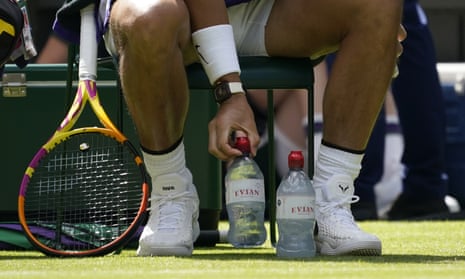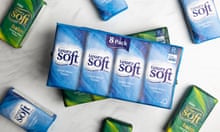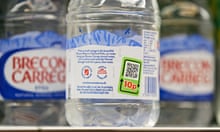The former junior Wimbledon champion Laura Robson has joined calls for Wimbledon to limit the use of plastic bottles.
The 28-year-old added that Wimbledon should ban single-use bottles altogether or limit players to just one, adding that fines for breaching the rules were “maybe something that needs to happen”.
But the Olympic silver medallist acknowledged that restrictions would hit Spain’s Rafael Nadal, because he is “superstitious” and known for carefully lining up multiple water bottles as part of a long-established courtside ritual.
In a panel discussion about the environment at SW19 today, Robson said: “There are all the players on the practice courts, just taking a couple of sips from a water bottle and then leaving it there. Should there be a fine, maybe? We’re joking about it, but maybe that’s something that needs to happen.
“I don’t know how you would go about implementing that, whether you would have court covers snitching on people on the court. I don’t know how you would go about organising it but it would be a start.”
Robson was joined by Hattie Park, the All England Lawn Tennis Club’s sustainability manager, and former GB rower Melissa Wilson, who said Wimbledon should follow the French Open’s lead. Players used only reusable bottles this year after a government ban in France on single-use plastic.
“The players had to use reusable bottles and they were branded by a sponsor,” Park said. “I think the fact that that’s just happened at another grand slam tournament … offers potentially an alternative [for Wimbledon].”
But Robson said athletes would need to stick to one bottle for the plan to be effective. “I was watching a lot of matches in Paris and people had multiple reusable bottles because you’ve got your water, your energy drinks, your electrolytes and all sorts,” she said. “As soon as you put someone then using five reusable bottles, it sort of loses its power.”
Campaigners have criticised Wimbledon and Evian, which sponsors the competition, for providing players with single-use bottles. Hundreds of thousands of bottles are used at the tournament each year, with an estimated 420,000 distributed in 2019.
Maja Darlington, a plastics campaigner for Greenpeace UK, said: “Wimbledon is a world renowned event. If they can afford to pay players £50,000 for simply participating in the first round, they can afford to provide them with reusable water bottles and ensure they aren’t contributing to the ever-growing plastic crisis.”
Robson said that tennis has “such a long way to go” to become environmentally friendly but introducing reusable cups on court could be a “big change”.
“We’ve also got players who are superstitious – you know, Rafael with his water bottles, and they all need to be in a certain row,” she said. “There’s other players who prefer the plastic bags around the rackets after a restring. And it’s just slowly but surely changing the mindset.”
Nadal, a 22-time grand slam title winner, has commented on his courtside routine, saying he takes “a sip from one bottle, and then from another. And then I put the two bottles down at my feet, in front of my chair to my left, one neatly behind the other, diagonally aimed at the court.”
He has previously been hit with a number of violations for taking too long between points as he performs his ritual, which also includes picking at his underwear.
Robson said there were wider problems with tennis’s environmental credentials: “We’re travelling every week. Usually on a plane – there’s hardly any opportunities to use other forms of transport – and then you get to a big tournament like this. And you know, there’s a fleet of Land Rovers, which are lovely, but not necessarily that environmentally friendly.”
Park said the club was working with Evian about the possibility of installing water refill stations on court, and spectators could bring reusable bottles to SW19. The club has previously said Evian’s bottles are made from 100% recycled plastic.
On environmental goals, Park added: “There’s progress that we need to go way up, we are actively talking with our partners about how we can improve and get better.”










